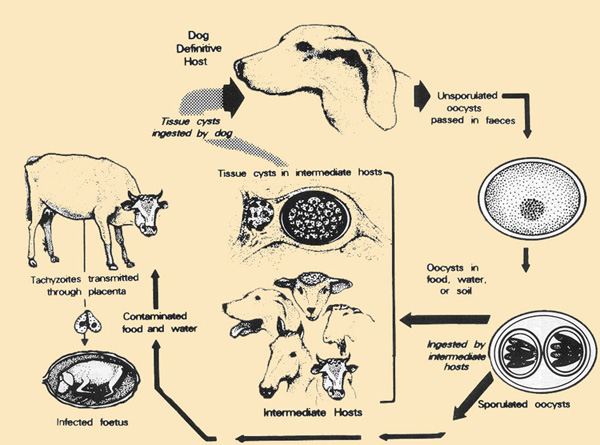Neosporum or neospora caninum in dogs is a coccidian parasite causing the infection called neosporosis. This one-celled parasite is most commonly seen in dogs and cattle and causes damage to the muscles and nervous system. It is similar to toxoplasmosis, the disease feared by pregnant women handling cat litter.
Causes of Neosporum in Dogs
Neospora in dogs can be contracted by drinking infected water, eating infected raw meat, or placentas from livestock. Mother dogs can transmit the parasite to their pups through the placenta or through the milk. This is one of the reasons we discourage feeding raw meat diets to females in breeding programs. Even if you are not currently feeding a raw meat diet, your dams can harbor the parasite. Then, pregnancy can initiate parasite multiplication, followed by transmission thought the placenta and into the fetus. Adults may have the parasite but not have symptoms.
Puppies under six months of age are the most commonly affected group. Adult dogs rarely show symptoms. Within five to eight days of exposure, nerve tissues die, interrupting nerve impulses, and causing clinical signs.
Life Cycle of Neospora in Dogs

Image courtesy: Agricultural Research Service- U.S. Department of Agriculture
Neosporosis Symptoms in Dogs
Neosporosis in dogs symptoms and clinical signs include hyper-reactivity, muscle swelling or muscle atrophy in very young puppies. Puppies may have pneumonia, respiratory distress, heart disease, diarrhea, difficulty swallowing, neck weakness, incoordination, joint abnormalities, paralysis of all four legs with the rear legs most severely affected, rigid legs, or death. The animal may be down or alert on presentation. Progressive incoordination and weakness, weight loss, loss of appetite, circling, fast heart rate, head tilt, abnormal eye movement, high stepping walking, head tremors, delayed placing movements, cranial nerve dysfunction, unequal pupils, paralysis, cervical hyperesthesia, and seizures have also been reported. In other words, neurologic disorders or many other symptoms can be associated with a neosporum infection.
How Do I Know if My Dog has Neospora?
To diagnose neosporosis in dogs, blood work at your veterinary clinic (CBC and chemistry panel) will not have specific changes, in other words, typical bloodwork won’t show this parasite. A PCR assay or titer or test specifically looking for the antibodies of the neosporum parasite is most helpful. However, it can take over three weeks to get the results. The most effective way to test is to run two samples three weeks apart to compare results, looking for a rise in the antibody test indicating recent active infection. When checking for chronic disease, an indirect fluorescent antibody test (IFAT) is the test of choice. Antibody tests can be used to differentiate toxoplasmosis from neosporosis. Fecal tests are not generally useful as the eggs are not typically shed in the stools.
Imaging such as X-rays and MRI do not yield specific findings. Tissue samples are also not definitive. Rarely a CSF (Cerebrospinal fluid tap) is diagnostic.
Neosporosis in Dogs Treatment and Prevention
Neosporosis treatment in dogs consists of using two antibiotics, clindamycin combined with trimethoprim/sulfonamide for four to eight weeks. Treatment is most effective if started early, even if neosporum is suspected but while waiting for test results to return. Waiting until muscle contracture occurs may make treatment unsuccessful. Other treatments may consist of pyrimethamine and ponazuril (an extra-label drug use). Avoid the use of any immunosuppressive drugs.
If one puppy is diagnosed with the parasite, other litter mates should be tested and/or treated as well. The prognosis is poor to guarded.
Prevention is best achieved by avoiding feeding raw or undercooked meat, avoiding contact with placentas on farms, and removing feces. There has not been any indication of human disease.
If you have more questions on Neosporosis in dogs, give a Pet Care Pro a call at 800.786.4751.
LEARN MORE:
Toxoplasmosis in Cats
Toxoplasmosis in cats (Toxo) is a parasite infection. Learn Toxo in cats treatment, prevention and toxoplasmosis gondii symptoms.
Coccidia in Dogs and Cats
What are the symptoms of coccidia in dogs? What is the best coccidia in cats treatment? After first exposure, Coccidian parasites can remain present in your cat or dog's intestines to take advantage of any digestive upset. Learn how to treat Coccidia.
Treating Diarrhea in Newborn Puppies or Kittens
Diarrhea in newborn puppies or kittens isn't always normal and can cause concern. Learn the possible causes of diarrhea in puppies and kittens and treatments.
Intestinal Parasites in Dogs Webinar
What are signs of worms in dogs? What are the most common dog parasites? What dewormers are safe for pregnant and nursing dogs? This dog parasite webinar answers common questions when it comes to parasites in dogs.
Written by: Marty Greer, DVM
Director of Veterinary Services
Marty Greer, Doctor of Veterinary Medicine, has 40+ years’ experience in veterinary medicine, with special interests in canine reproduction and pediatrics. She received her Doctor of Veterinary Medicine from Iowa State University in 1981. She’s served as Revival’s Director of Veterinary Services since 2019. In 2023, Dr. Greer was named the Westminster Kennel Club Veterinarian of the Year.